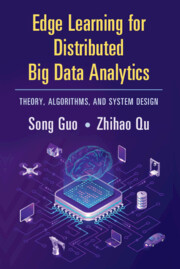Book contents
- Frontmatter
- Contents
- List of Figures
- List of Tables
- 1 Introduction
- 2 Preliminary
- 3 Fundamental Theory and Algorithms of Edge Learning
- 4 Communication-Efficient Edge Learning
- 5 Computation Acceleration
- 6 Efficient Training with Heterogeneous Data Distribution
- 7 Security and Privacy Issues in Edge Learning Systems
- 8 Edge Learning Architecture Design for System Scalability
- 9 Incentive Mechanisms in Edge Learning Systems
- 10 Edge Learning Applications
- Bibliography
- Index
7 - Security and Privacy Issues in Edge Learning Systems
Published online by Cambridge University Press: 14 January 2022
- Frontmatter
- Contents
- List of Figures
- List of Tables
- 1 Introduction
- 2 Preliminary
- 3 Fundamental Theory and Algorithms of Edge Learning
- 4 Communication-Efficient Edge Learning
- 5 Computation Acceleration
- 6 Efficient Training with Heterogeneous Data Distribution
- 7 Security and Privacy Issues in Edge Learning Systems
- 8 Edge Learning Architecture Design for System Scalability
- 9 Incentive Mechanisms in Edge Learning Systems
- 10 Edge Learning Applications
- Bibliography
- Index
Summary
Conventional distributed machine learning manages the training data in a centralized mode without considering the privacy and security problems during training or inference. With the rapid development and wide deployment of artificial intelligence technology these days, privacy protection has gained more and more attention. Moreover, EL participants usually are small devices (e.g., smartphones, sensors) that have weak defense ability and can be easily compromised under possible attacks. In this chapter, we first introduce a security guarantee mechanism in Edge Learning including the defense methods for data-oriented attacks and model-oriented attacks. Then, we summarize the mainstream methods of privacy protection including differential privacy, secure multi-party computation, and homomorphic encryption. Finally, we discuss future directions in this field.
- Type
- Chapter
- Information
- Edge Learning for Distributed Big Data AnalyticsTheory, Algorithms, and System Design, pp. 112 - 130Publisher: Cambridge University PressPrint publication year: 2022

